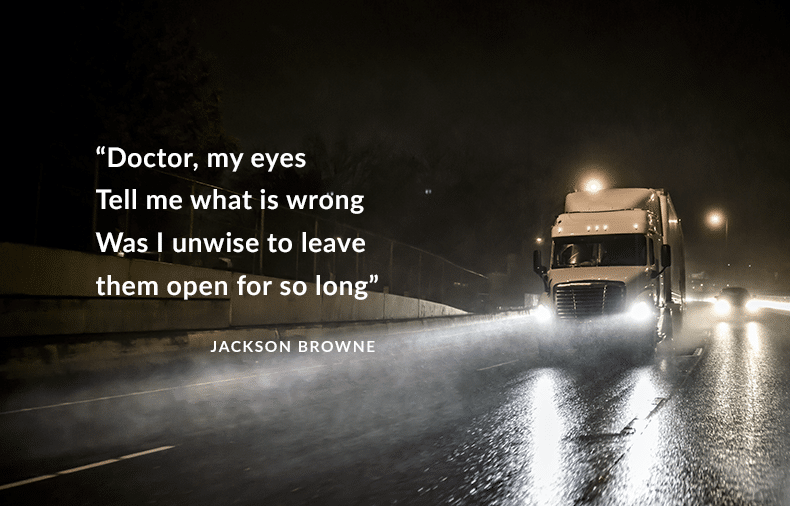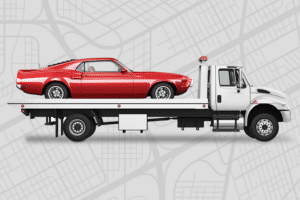When I moved to Arizona 14 years ago, I wanted to try something different, so I got a job practicing eye care in a variety of nursing homes and prisons all over my adopted state.
I carried my equipment in the back of my diesel car and routinely drove 3,000 miles a month and up. It wasn’t unusual for me to drive from my home in Phoenix down to Tucson or Yuma one day, then up to Winslow, Flagstaff, or Sedona the next.
While that kind of mileage may be all in a day’s work for you as a transporter, racking up that many monthly miles taught me how to fight stress and fatigue, especially vision fatigue, while on the road.
Being tired from a day on the road left my eyes tearing, strained, and sensitive to light. From my car gauges and dials to oncoming headlights, it became challenging to keep my eyes on the road and pay attention to my surroundings.
My hope is that all you road warriors out there can better fight night vision issues that would otherwise get in the way of driving for a living. So, here are some tips I’d like to share…
Best Glasses for Night Driving: Lenses, Tints, and Eyewear
One of the biggest challenges on the road at night is how to cope with glare and bright lights, especially when your eyes are tired and slow to adapt.
The best thing I did for myself was to get a pair of eyeglasses specifically for night driving.
I have a slight prescription for seeing far away, so I incorporated that into my night driving glasses. I also had…
- Anti-reflective and high definition lenses in my frames, which made streetlights and oncoming headlights much less irritating to my eyes.
- Lenses that were tinted yellow (or amber) to maximize my night vision clarity and focus.
- A comfortable fit for my face, with no pinching or looseness. Otherwise, due to wear and tear, you would routinely have to get your glasses readjusted to fit perfectly on your face.
- You can also get bifocals with or without the line for both distance and reading needs.
- If you need to work on your rig at night, you can get a pair of LED reading glasses to illuminate your space.
All of the above can be purchased, at a reasonable cost, through online vendors like ReadingGlasses.com and with minimal risk since most have a generous money-back guarantee.

Driving at Night Tips: Handling Eyestrain, Dryness, and Tearing
Safeguarding your vision is essential, but you also have to take care of how your eyes feel.
After many hours on the road, your eyes tend to get watery and strained. To fight this, I always had a bottle of cold artificial tears handy in my icebox so that I could stop somewhere and put a drop in whenever my eyes felt uncomfortable.
It’s like taking a cold shower for your eyes. It wakes them up and comforts them simultaneously, so you feel more alert and energized.
I also had a cooling eye mask I kept in my icebox, to help my eyes relax at a rest stop when they were especially irritated and tired.
Other Considerations
If you do all of the above and still feel your night vision is especially bad, it would be good to visit your nearest eye doctor so they can have a look at your peepers.
I know you’ll say, “I don’t have the time for this.” But it’s so crucial that you really do have to make the time.
Here’s why…
Night vision problems can sometimes be due to underlying eye diseases like cataracts, glaucoma, and macular degeneration. All of which can be managed by the eye doctor if diagnosed early.
On the other hand, if you let a condition like this run its course unchecked, it can permanently damage your vision and take away your livelihood.
One of the most common reasons people have night blindness is that they have uncorrected nearsightedness or other refractive errors. And that’s a simple fix: The eye doctor can prescribe you a pair of glasses to correct it.
Good Vision Means Better Driving
Your eyes are essential when it comes to being on the road. Good vision prevents you from getting into an accident and hurting yourself and others. So, you must take care of your eyes in the best possible way.
Taking the precautions listed above will go a long way toward making your next trip a more relaxing and rewarding one.




